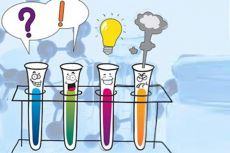Read the passage below and choose the correct answer A, B, C or D
ELEKTRON TO ELECTRIC
The first discovery of electricity is over 2,600 years old. Does that surprise you? Of course, there were no lights, telephones, refrigerators, radios, motion pictures, or television sets that long ago. In fact, all of these modern conveniences are of such recent development that you might well wonder how electricity could be any older than Thomas Edison's development of the first practical electric light bulb in 1879.
The word electricity comes from the Greek word meaning amber, which is elektron. The fossilized sap of a pine tree, amber looks much like a hard lump of honey. In 600 B.C., a Greek philosopher named Thales rubbed a piece of amber against his sleeve to shine it. Much to his interest, he found that the rubbed amber attracted small bits of lint, feathers, and dried leaves. This property of attraction was a strange characteristic which he thought only amber had. Today, our word electricity still goes back to Thales' early discovery about amber.
More than two thousand years after Thales, an English physician discovered that other substances also had this characteristic of electricity. From then on, more and more men added to the knowledge of electricity. They set off the many developments and discoveries which have brought about our electrical era of today.
Câu 20 : While not directly stated, it may be inferred from the article that _________.
Hãy suy nghĩ và trả lời câu hỏi trước khi xem đáp án
Lời giải:
Báo saiKiến thức: Đọc hiểu suy luận
Giải thích:
Mặc dù không được nêu trực tiếp, nó có thể được suy ra từ bài báo rằng _________________
A. hổ phách là chất duy nhất có thể nhiễm từ
B. điện là một khám phá gần đây
C. Thomas Edison thực sự phát minh ra điện
D. các sự kiện có thể được quan sát rất lâu trước khi chúng được đưa vào sử dụng thực tế
Thông tin: In fact, all of these modern conveniences are of such recent development that you might well wonder how electricity could be any older than Thomas Edison's development of the first practical electric light bulb in 1879
(Trên thực tế, tất cả những tiện nghi hiện đại này đều mới phát triển đến mức bạn có thể tự hỏi làm thế nào mà điện có thể lâu đời hơn sự phát triển của Thomas Edison về bóng đèn điện thực tế đầu tiên vào năm 1879)
Chọn D.
Câu 21 : This article as a whole tells us _____________.
Hãy suy nghĩ và trả lời câu hỏi trước khi xem đáp án
Lời giải:
Báo saiKiến thức: Đọc hiểu ý chính
Giải thích:
Toàn bộ bài báo này cho chúng ta biết _____________
A. về điện
B. về hổ phách
C. về sự tò mò của một nhà triết học Hy Lạp cổ đại
D. về Thomas Edison
Thông tin:
The first discovery of electricity is over 2,600 years old.
(Phát hiện đầu tiên về điện đã hơn 2.600 năm tuổi.)
The word electricity comes from the Greek word meaning amber, which is electron
(Từ điện bắt nguồn từ tiếng Hy Lạp có nghĩa là hổ phách, là electron)
More than two thousand years after Thales, an English physician discovered that other substances also had this characteristic of electricity
(Hơn hai nghìn năm sau Thales, một bác sĩ người Anh đã phát hiện ra rằng các chất khác cũng có đặc tính điện này)
Chọn A.
Câu 22 : Which device was the first practical application of electricity?
Hãy suy nghĩ và trả lời câu hỏi trước khi xem đáp án
Lời giải:
Báo saiKiến thức: Đọc hiểu chi tiết
Giải thích:
Thiết bị nào là ứng dụng thực tế đầu tiên của điện?
A. tủ lạnh
B. radio
C. bóng điện
D. điện thoại
Thông tin: In fact, all of these modern conveniences are of such recent development that you might well wonder how electricity could be any older than Thomas Edison's development of the first practical electric light bulb in 1879
(Trên thực tế, tất cả những tiện nghi hiện đại này đều mới phát triển đến mức bạn có thể tự hỏi làm thế nào mà điện có thể lâu đời hơn sự phát triển của Thomas Edison về bóng đèn điện thực tế đầu tiên vào năm 1879)
Chọn C.
Câu 23 : Elektron is _______.
Hãy suy nghĩ và trả lời câu hỏi trước khi xem đáp án
Lời giải:
Báo saiKiến thức: Đọc hiểu chi tiết
Giải thích:
Elektron là ___________
A. khả năng tạo ra điện của hổ phách
B. tính chất thu hút của hổ phách
C. đặc tính kỳ lạ của hổ phách
D. từ tiếng Hy Lạp có nghĩa là hổ phách
Thông tin: The word electricity comes from the Greek word meaning amber, which is elektron.
(Từ điện bắt nguồn từ tiếng Hy Lạp có nghĩa là hổ phách, là electron)
Chọn D.
Câu 24 : Which sentence is NOT true?
Hãy suy nghĩ và trả lời câu hỏi trước khi xem đáp án
Lời giải:
Báo saiKiến thức: Đọc hiểu chi tiết
Giải thích:
Câu nào không đúng?
A. Tên gọi điện bắt nguồn từ tiếng Hy Lạp có nghĩa là hổ phách.
B. Hổ phách là nhựa cây tươi chảy ra từ cây tùng.
C. Nhiều, nhiều người đã thêm vào khám phá ra điện.
D. Thales là nhà triết học người Hy Lạp sống ở thời cổ đại.
Thông tin: The fossilized sap of a pine tree, amber looks much like a hard lump of honey.
(Có người cho rằng hồ phách giống nhựa cây thông hóa thạch nhưng hổ phách trông giống như một cục mật ong cứng.)
Chọn B.
Đề thi HK1 môn Tiếng Anh 10 KNTT năm 2022-2023
Trường THPT Nguyễn Trãi











